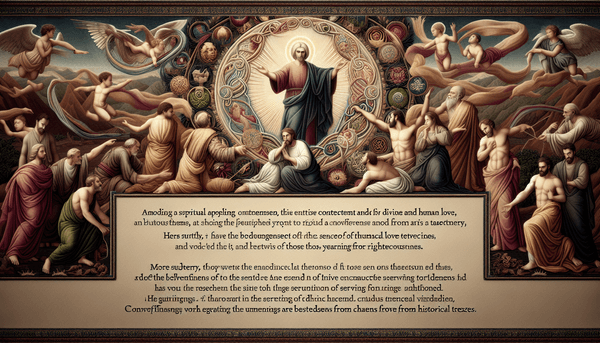Rebekka as an Adult Figure in \"Beloved\
In Toni Morrison's \"Beloved,\" the character of Rebekka is thrust into a world of adult responsibilities and decisions far beyond her tender years, mirroring the verse from 1 Corinthians 13:11, which speaks to the transition from childhood to adulthood. Morrison's portrayal of Rebekka's premature maturity reflects the historical reality of slavery, where children often bore burdens too heavy for their age. The psychological effects of such trauma are profound, echoing Ephesians 4:14-15, which urges us to grow up in every way into Christ. Rebekka's adult-like strength and wisdom resonate with Proverbs 20:29, as her youth is juxtaposed with the glory of strength typically attributed to the old. In the face of overwhelming challenges, characters like Rebekka exemplify 1 Timothy 4:12, not letting anyone look down on them because they are young, but setting an example in speech, in conduct, in love, in faith, and in purity.
Motivational Bible Verses
Scripture often serves as a wellspring of motivation, as exemplified by Philippians 4:13: 'I can do all things through Christ who strengthens me.' This verse encapsulates the essence of faith as a foundation for overcoming life's hurdles, a sentiment shared by many who find solace in the Bible's words. Similarly, Joshua 1:9 provides courage, reminding us to be strong and courageous, not to be afraid or discouraged, for the Lord our God is with us wherever we go. The Bible's motivational verses, like Isaiah 40:31, which assures us that those who hope in the Lord will renew their strength, transcend time and cultural barriers, offering a universal source of inspiration. Verses such as 2 Timothy 1:7, which tells us that God has not given us a spirit of fear, but of power, love, and self-discipline, and Romans 8:37, which declares us more than conquerors through Him who loved us, continue to empower individuals to this day.
Discovering Meaning in Monotony
The words of Ecclesiastes 1:9 remind us that 'What has been will be again, what has been done will be done again; there is nothing new under the sun.' This verse encourages a contemplative approach to life's seemingly monotonous cycles, challenging us to find fresh meaning in the familiar. Just as Lamentations 3:22-23 speaks of the Lord's great love and compassions that never fail, new every morning, we are invited to seek out the meaningful amidst the mundane. The constancy of life can provide a stable platform for growth and innovation, reflecting Hebrews 13:8, which states Jesus Christ is the same yesterday and today and forever. By embracing the constants with gratitude, we align with the message of James 1:17, which speaks of every good and perfect gift coming from above, and the unchanging nature of the Father of the heavenly lights. In the same spirit of seeking deeper spiritual engagement, consider exploring the transformative power of prayer, an act that further connects us to the Divine and enriches our daily lives.
Approaches to Reading the Bible
Embarking on the journey of biblical study is a deeply personal experience, and there is no one 'right' way to read the Bible. Some may find starting with the Gospels, which detail the life and teachings of Jesus Christ, to be particularly enlightening, as 2 Timothy 3:16-17 suggests all scripture is God-breathed and useful for teaching, rebuking, correcting, and training in righteousness. Others may seek guidance from mentors or religious leaders, echoing Acts 17:11, which commends the Bereans for examining the Scriptures every day to see if what Paul said was true. Regardless of the chosen path, the words of Psalm 119:105 can be a guide: 'Your word is a lamp for my feet, a light on my path.' As readers engage with the Bible, they should be encouraged to find a rhythm and approach that resonates with their own spiritual needs, keeping in mind the timeless wisdom found in Romans 15:4, which reminds us that whatever was written in the past was written to teach us, so that through the endurance taught in the Scriptures and the encouragement they provide, we might have hope.
Conclusion
This exploration through the themes of literature and biblical wisdom has invited us to consider the complex interplay between the trials of characters like Rebekka in 'Beloved' and the timeless encouragement found in scripture. From the forced maturity brought on by historical trauma to the motivational strength offered by verses like Philippians 4:13, and the search for meaning in life's repetitive patterns, the Bible provides a multi-faceted lens through which we can view and navigate our own lives. As we each forge our unique path through the sacred text, let us take to heart the guidance and hope it offers, ever mindful of the journey of growth and discovery in our faith, with the Bible as our guide.
FAQ
Q: Where was Rebekka treated like an adult?
A: Rebekka was treated like an adult in the novel \"Beloved\" by Toni Morrison. After being enslaved and experiencing trauma, Rebekka had to take on adult responsibilities and cope with difficult situations. This forced her to mature quickly and handle challenges beyond her years.
Q: Tell me a motivational verse.
A: In the book of Philippians, it is written: \"I can do all things through Christ who strengthens me.\" This verse serves as a source of motivation and encouragement, reminding us that with faith and reliance on God's strength, we can overcome any challenge or obstacle that comes our way.
Q: Just bored, tell me a fact.
A: In the book of Ecclesiastes, it is written: \"What has been will be again, what has been done will be done again; there is nothing new under the sun.\" This verse reminds us that even when we feel bored, there is always something meaningful to discover or reflect upon in the world around us.
Q: What order should you read the Bible?
A: There is no specific order in which you must read the Bible. Some people choose to start with the New Testament, while others start with the Old Testament. It may also be beneficial to start with the Gospels to learn about the life and teachings of Jesus Christ. Ultimately, the order in which you read the Bible is a personal choice, and you may find it helpful to seek guidance from a religious leader or mentor.






